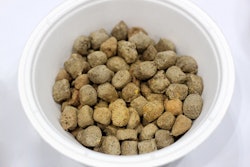
Welsh Corgi breeders benefited from genetic mapping to help them avoid congenital health problems, inbreeding and other issues related to the stubby-legged dogs’ well-being. One long-time Pembroke Welsh Corgi breeder, Bill Shelton, told me his operation has spent millions on research to devise DNA markers and identify genetic anomalies within specific dogs. I spoke with Shelton at this year’s American Kennel Club National Championship in Orlando, Florida.
Transparency note: Royal Canin paid for my airfare and expenses in Florida and facilitated my interviews with breeders and company executives.
Before Corgi’s benefited from Queen Elizabeth II's patronage, the dogs were a working class variety for the people of Cymru, or Wales. As peasant pups, the dogs had to survive on what they could get. Corgi’s have highly efficient guts that can process food with fewer lost calories than a German Shepherd, for example, Shelton said. Many of the genetic issues screened for in Corgis relate to digestion, he said. Identifying genetic issues allows breeders to know which dogs’ progeny might not have the iron stomachs of their ancestors.
Understanding the genetic basis of Corgi digestion helps with pet food product development too. Shelton works with dog food makers, including Royal Canin, to develop formulations that meet Corgi’s specific biological needs. He depends on those purposely formulated dog foods for his purposely bred dogs to ensure predictable outcomes, he said.
Using genomics to formulate pet foods may have another application that could address the largest controversy in the pet food industry currently: canine dilated cardiomyopathy (DCM).
Could genomics lead to DCM answers?
Two decades ago, sequencing a single person’s genome took hundreds of scientists, engineers and technicians. The feeling of monumental discovery and pioneering spirit inspired all of the people working on the Human Genome Project, including myself as a lab technician operating the MegaBACE machines and refilling buffer containers. I was pretty much the lowest possible ranking person, but it was still a cool feeling.
Now, people gift genetic analysis kits for Christmas. Beyond that, every day dog owners, not just top breeders, can have their pets’ DNA decoded to shed light on health issues and breed history, which can lead to dietary solutions.
In 2004, geneticists published the first draft sequence of the domestic dog genome and made it publicly available through the National Human Genome Research Institute. In 2016 for his thesis, a University of Missouri – Columbia researcher analyzed 145 dogs from 69 different breeds with inherited genetic disorders. He identified genetic components of DCM in Standard Schnauzers. Read more about this and related research in an upcoming article in Petfood Industry magazine by George Collings, PhD.
Most in the pet food industry are well aware of the results of FDA’s announcements about the agency’s investigation into correlations between certain dog food formulations and DCM. Grain-free dog food sales have suffered in the U.S., especially for those brands named by the FDA. In reaction to DCM fears, various new dog food products and marketing campaigns arose.
At the same time, various dog food companies now offer customized formulations for individual dogs. With more effort to identify the genetic components of DCM, perhaps dog foods could be formulated specifically for at-risk dogs.

















